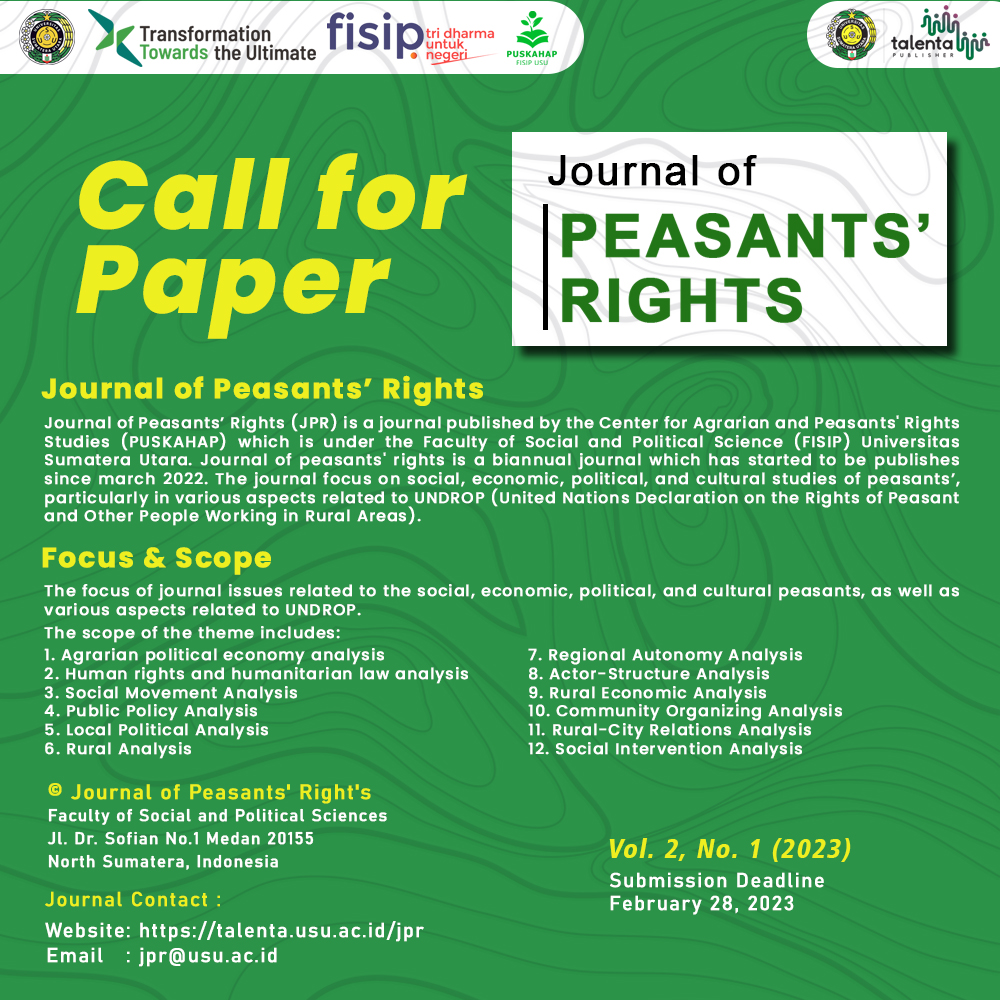The Role of Social Entrepreneurs in Transforming Yemen's Agricultural Landscape
DOI:
https://doi.org/10.32734/jpr.v3i2.19086Keywords:
Peasants, Entrepreneurial Role, Social Entrepreneurship, Agricultural Landscape, YemenAbstract
Social entrepreneurship in Yemen offers innovative solutions to agricultural challenges amidst economic and social crises. By integrating sustainability and community empowerment, the program addresses issues such as land degradation, climate change, and food security and fosters local economic resilience and self-reliance. This research aims to analyze the role of social entrepreneurship in transforming Yemen's agricultural sector, addressing economic challenges, environmental degradation, and social vulnerability due to conflict. This research method uses a descriptive-analytical approach. The data collection technique is a literature study conducted by collecting data from various written sources such as books, scientific journals, articles, research reports, and relevant policy documents. The data analysis technique applied in this research is descriptive qualitative analysis. Social entrepreneurship is crucial in transforming Yemen's agricultural sector, addressing economic challenges, environmental degradation and social vulnerability due to conflict. Initiatives such as organic farming, cooperative management, and the adoption of innovative technologies sustainably increase agricultural productivity. In addition, social entrepreneurship supports the digitalization of agriculture through programs that provide access to real-time information and energy-saving technologies. For example, the Barq Foundation helps farm management, reduces operational costs, and improves food security. The study concludes that social entrepreneurship strengthens sustainable development and food security in Yemen.
Downloads
References
Ahmad, S. Z., & Xavier, S. R. (2011). Preliminary investigation of Yemeni women entrepreneurs: some challenges for development and barriers to success. International Journal of Entrepreneurship and Small Business, 13(4), 518. https://doi.org/10.1504/ijesb.2011.041841
Aini, E. K., Yuliaji, E. S., & Nafisa, L. (2023). SOCIAL ENTREPRENEUR AS AGENT OF CHANGE FOR SUSTAINABLE DEVELOPMENT. Fostering Sustainable Entrepreneurship in Emerging Market: An Interdisciplinary Perspective, 249–264. https://doi.org/10.11594/futscipress26
Altman, M. (2015). Cooperative organizations as an engine of equitable rural economic development. Journal of Co-Operative Organization and Management, 3(1), 14–23. https://doi.org/10.1016/j.jcom.2015.02.001
Ashby, J., Heinrich, G., Burpee, G., Remington, T., Wilson, K., Quiros, C. A., … Ferris, S. (2009). What farmers want: collective capacity for sustainable entrepreneurship. International Journal of Agricultural Sustainability, 7(2), 130–146. https://doi.org/10.3763/ijas.2009.0439
Bahn, R. A., Yehya, A. A. K., & Zurayk, R. (2021). Digitalization for Sustainable Agri-Food Systems: Potential, Status, and Risks for the MENA Region. Sustainability, 13(6), 3223. https://doi.org/10.3390/su13063223
Basha, Z. A. (2022). The agrarian question in Yemen: the national imperative of reclaiming and revalorizing indigenous agroecological food production. The Journal of Peasant Studies, 1–52. https://doi.org/10.1080/03066150.2021.2002849
Bozhikin, I., Macke, J., & da Costa, L. F. (2019). The role of government and key non-state actors in social entrepreneurship: A systematic literature review. Journal of cleaner production, 226, 730-747
Breisinger, C., Ecker, O., Funes, J., & Yu, B. (2024). Food as the Basis for Development and Security A Strategy for Yemen. Retrieved from International Food Policy Research Institute website: https://www.ifpri.org/cdmref/p15738coll2/id/5487/filename/5488.
Brieger, S. A., & De Clercq, D. (2019). Entrepreneurs’ individual-level resources and social value creation goals: The moderating role of cultural context. International Journal of Entrepreneurial Behavior & Research, 25(2), 193-216.
Brinckerhoff, P. C. (2000). Social entrepreneurship: the art of mission-based venture development. New York: Wiley.
Costantini, A., Pastorelli, G., & Sebillo, A. (2019). How Social Enterprises Contribute to Alternative Food Systems. Retrieved from https://www.diesis.coop/wp-content/uploads/2019/10/WP2019-14.pdf
Dees, J. G. (2001). The Meaning of “Social Entrepreneurship.” Retrieved from Centers.fuqua.duke.edu website: http://www.fuqua.duke.edu/centers/case/documents/dees_SE.pdf
Dixon, J., Gulliver, A., & Gibbon, D. (2001). Farming systems and poverty improving farmers’ livelihoods in a changing world. Rome and Washington DC: FAO and World Bank. Retrieved from https://openknowledge.fao.org/server/api/core/bitstreams/49d65d89-37a4-4384-a9f6-eb470bc9e9a2/content
Dubey, R. K. (2011). Organic Farming Benificial to Biodiversity Conservation, Rural Livelihood and Nutritional Security. Indian Journal of Applied Research, 3(11), 18–21. https://doi.org/10.15373/2249555x/nov2013/7
Egelyng, H. (2009). Article Organic Agriculture: a new field of policy for international organizations. Retrieved from https://orgprints.org/id/eprint/16352/1/16352.pdf
Finger, R. (2023). Digital innovations for sustainable and resilient agricultural systems. European Review of Agricultural Economics, 50(4). https://doi.org/10.1093/erae/jbad021
Fraenkel, P. (1986). Water Lifting Devices. Rome: Food And Agriculture Organization Of The United Nations.
Fukuyama, F. (1995). Trust: The Social Virtues and The Creation of Prosperity. New York: Free Press Paperbacks.
Golmohammadi, F. (2018). Farmer Cooperatives as an Agricultural Innovation System for Organizing and Changing Rural Land Use from Peasantry to Collective Action Among Villagers in Iran. Black Sea Journal of Agriculture, 1(2).
Hazeltine, B., & Bull, C. (1999). Appropriate Technology: Tools, Choices and Implications. Cambridge: Academic Press.
Horne, J. E., & Mcdermott, M. (2001). The Next Green Revolution. Florida: CRC Press.
Hota, P. K., Subramanian, B., & Narayanamurthy, G. (2020). Mapping the intellectual structure of social entrepreneurship research: A citation/co-citation analysis. Journal of business ethics, 166(1), 89-114.3
Indriana, H., Kinseng, R. A., & Adriana, G. (2016). DINAMIKA KELEMBAGAAN PERTANIAN ORGANIK MENUJU PEMBANGUNAN BERKELANJUTAN. Sodality: Jurnal Sosiologi Pedesaan, 4(2). https://doi.org/10.22500/sodality.v4i2.13652
Kerlin, J. A. (2007). Social Enterprise: At the Crossroads of Market, Public Policies and Civil Society, edited by Marthe Nyssens. London and New York: Routledge, 2006. 335 pp., $46.95. Nonprofit and Voluntary Sector Quarterly, 36(4), 747–750. https://doi.org/10.1177/0899764007305025
Kerlin, J. A. (2009). Social Enterprise at the Crossroads of Market, Public Policies and Civil Society (M. Nyssens, Ed.). London: Routledge.
Khan, S. A., Magd, H., Shamsi, A., & Masoom, K. (2022). Social Entrepreneurship Through Innovations in Agriculture. Advances in Logistics, Operations, and Management Science Book Series, 209–222. https://doi.org/10.4018/978-1-6684-4666-9.ch010
Kim, W.-S. (2023). Data-Driven Agricultural Innovation Technology for Digital Agriculture. Applied Sciences, 13(20), 11163–11163. https://doi.org/10.3390/app132011163
Lampkin, N. (2002). Organic farming. Ipswich: Old Pind Publishing.
Martin Varisco, D. (2010). The Milh al-Malâha of al-Malik al-Ashraf ‘Umar (d. 696/1296). Chroniques Du Manuscrit Au Yémen, (9). https://doi.org/10.4000/cmy.1892
Mayo, E. (Ed.). (2015). The Co-operative Advantage. Oxford: New Internationalist Publications Ltd.
Moreira, J., Marques, C. S., Braga, A., & Ratten, V. (2019). A systematic review
of women's entrepreneurship and internationalization literature. Thunderbird
International Business Review, 61(4), 635-648.
Patel, S., Maley, S., & Mehta, K. (2014). Appropriate Technologies in the Globalized World: FAQs [Commentary]. IEEE Technology and Society Magazine, 33(1), 19–26. https://doi.org/10.1109/mts.2014.2301855
Pretty, J. (2002). Agri-Culture Reconnecting People, Land and Nature. Oxford: Earthscan Publications.
Putnam, R. (2000). Bowling Alone: The Collapse and Revival of American Community. New York: Simon & Schuster.
Rosca, E., Agarwal, N., & Brem, A. (2020). Women entrepreneurs as agents of change: A comparative analysis of social entrepreneurship processes in emerging markets. Technological Forecasting and Social Change, 157, 120067.
Rhena, J., Hayadin, M. R., & Amory, S. (2024). The Significance of Social Entrepreneurship in Generating Solutions to Social and Economic Challenges. Journal of Contemporary Administration and Management (ADMAN), 1(3), 307–311. https://doi.org/10.61100/adman.v1i3.154
Saleh, K. (2024). The Role of Small Agricultural Projects in Achieving Food Security in Yemen. Journal of Agricultural Sciences and Sustainable Development, 1(2), 94–108. https://doi.org/10.21608/jassd.2024.267193.1009
Sljukic, S. (2007). AGRICULTURAL COOPERATIVES AND RURAL DEVELOPMENT. Economics of Agriculture, 54(1), 41–51. https://doi.org/10.22004/ag.econ.245380
Sundari, V. M., Shriya, K., & Seshasai, S. J. (2024). Social Entrepreneurship. Advances in Business Strategy and Competitive Advantage Book Series, 599–612. https://doi.org/10.4018/979-8-3693-7903-5.ch024
Tinsley, E., & Agapitova, N. (2018). Private Sector Solutions to Helping Smallholders Succeed. In World Bank, Washington, DC eBooks. World Bank Group. https://doi.org/10.1596/29543
Urban, B. (2020). Entrepreneurial alertness, self-efficacy and social entrepreneurship intentions. Journal of Small Business and Enterprise Development, 27(3), 489-507.
Varisco, D. M. (1991). A Royal Crop Register from Rasulid Yemen. Journal of the Economic and Social History of the Orient, 34(1), 1–22. https://doi.org/10.1163/156852091x00148
Vázquez-Maguirre, M., & Portales, L. (2014). Social enterprise as a generator of quality of life and sustainable development in rural communities. Revista Científica Pensamiento Y Gestión, 37, 255–284. https://doi.org/10.14482/pege.37.7028
Yekimov, S., Prodius, O., Chelombitko, T., Poltorak, A., Sirenko, N., Dudnyk, A., & Chernyak, V. (2022). Reengineering of agricultural production based on digital technologies. IOP Conference Series: Earth and Environmental Science, 981(3), 032005. https://doi.org/10.1088/1755-1315/981/3/032005






